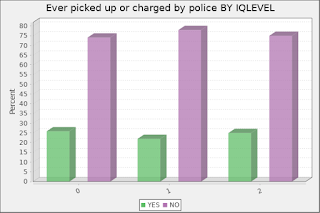If you're like me, you could use a break from all the coronavirus, stuff, so let's focus for a moment on race, IQ, and religion. The 2010-2014 World Values Survey asked 88,042 around the world whether they were religious, not religious, or atheist. Here are the percentages listed by country who answered that they were religious:
Percent religious
Pakistan
99.7
Georgia
97.1
Ghana
97.0
Nigeria
95.9
Rwanda
95.9
Qatar
93.8
South Africa
90.7
Haiti
90.3
India
88.8
Armenia
88.5
Yemen
86.3
Poland
86.2
Turkey
83.5
Colombia
82.5
Morocco
82.4
Peru
81.5
Romania
81.4
Philippines
80.7
South Africa
80.0
Brazil
79.7
Trinidad and Tobago
78.8
Cyprus
78.3
Iraq
76.8
Algeria
74.2
Mexico
74.2
Azerbaijan
73.2
Palestine
72.4
Ecuador
71.1
Libya
68.5
Ukraine
68.3
Argentina
67.8
USA
67.0
Total Sample
66.7
Tunisia
65.1
Slovenia
64.2
Lebanon
63.6
Belarus
62.2
Kazakhstan
61.7
Malaysia
53.7
Russia
53.1
Singapore
53.1
Uruguay
50.8
Chile
50.3
Germany
49.5
Uzbekistan
48.7
Netherlands
43.8
Taiwan
43.3
Netherlands
43.8
New Zealand
42.7
Spain
40.0
Thailand
32.0
Sweden
31.2
Estonia
30.9
Japan
20.9
Hong Kong
19.8
China
12.5
First, the world is quite religious: two-thirds of the total sample described themselves this way. On the other hand, there is tremendous variation. Almost all Pakistanis are religious, while few Chinese are.
On the issue of race, noticeable patterns emerge. South Asians and blacks tend to be very religious, and while the numbers here suggest Islam is associated with greater religiosity, countries like India, Ghana, and Rwanda show that South Asians and blacks do not need to be Muslim to be highly religious. The least religious country with lots of blacks is Trinidad and Tobago, but it is still well above average.
On the other end, East Asians are typically secular. China is at the bottom with 12.5% religious. Filipinos are the exception. This raises the importance of IQ in explaining religiosity. Depending on the estimate, mean IQ for the Philippines is between 74 and 86, and research clearly shows that lower IQ people tend to be more devout.
Europeans vary a lot with levels from 97.1% in Georgia down to 30.9% in Estonia. Historical factors are important, but a virtue of focusing on IQ is that it helps simplify the world--a major goal of science. Estonians, for example, have a mean IQ of around 100, while it is in the low to mid-90s in Georgia.
Muslim-dominated societies vary quite a bit, too, from 99.7% religious (Pakistan) to 48.7% (Uzbekistan). IQ appears to be a little higher in Uzbekistan. Malaysia, another somewhat secular, Muslim-dominated country (53.7% religious) has a mean IQ somewhere in the low-to-mid 90s. Overall, Muslim countries are religious.
Latin Americans countries are also fairly devout. On the high end, 82.5% of Colombians are religious, and on the low end, 50.3% of Chileans. Again, IQ might help explain the pattern: it's in the high 80s in Chile, but the low 80s in Colombia.
It looks like any association between race, ethnicity and religious devotion is, in large part, simply a reflection of differences in IQ. The simple three-race categorization works very well: blacks (low IQ/high religiosity), whites (medium IQ/medium religiosity), and East Asians (not Filipinos) (high IQ/low religiosity). We could add South Asians as well (low IQ/high religiosity).










